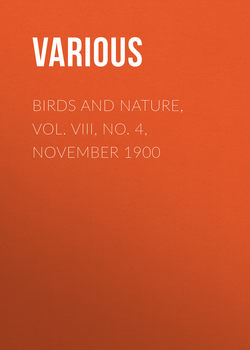Читать книгу Birds and Nature, Vol. VIII, No. 4, November 1900 - Various - Страница 3
CRUEL TREATMENT OF BIRDS DEMANDED BY DAME FASHION
ОглавлениеAll of my readers probably know in a general way that Dame Fashion is responsible for the destruction of the lives of many birds, but they may not know to what extent this is true.
Why do we say that any cruel treatment of the birds is chargeable to fashion? It can hardly be necessary to remind ourselves that there is in almost every boy's nature a touch of the savage instincts which find expression in the desire to kill something. Traces of this instinct do not entirely disappear with the development into manhood, but show themselves there in the love of hunting and fishing. Let these remnants of savagery be appealed to by the promise of gain and they are immediately fanned into flame in the natures of those persons who are naturally more strongly drawn to this primitive occupation of men. In short, place before the professional hunter an easy means of profiting by his skill as a hunter, and in far too many instances he will smother any humane instincts which he may have for the sake of the gain. It is the demands of fashion for plumes and feathers for hat trimmings which place before these hunters the temptation to kill. Have we not a right, therefore, to place the blame at the door of Fashion?
But what are the practices which we call cruel? In the first place it is cruelty to cause the destruction of life without good and sufficient reason. Unnecessary sacrifice of life is cruelty. Certainly no one will say that it is necessary to trim hats with feathers. Fashion decrees that feathers must be worn, and presto! feathers are worn. In the second place, it is cruel to kill birds who are feeding young ones in the nest, leaving them to starvation. Yet this is just what has happened and does happen every year. Plume hunters are no respecters of times and seasons. With them there are no closed seasons. The birds which they are after gather in large rookeries during the nesting season and are therefore much easier to capture then than at other times.
Most of the herons and similar plume-bearing birds are hunted and killed for the plumes alone, or, at most, for a very small part of the whole plumage. The part wanted is taken and the rest left to waste, while the bird's body is never used for anything. If nothing worse, it is an unpardonable waste. In Florida alone whole rookeries of herons and ibises numbering hundreds and even thousands of individuals have been wholly destroyed. Now the insatiable plume hunter, in his effort to supply the demands of a no less insatiable fashion, is pursuing the unfortunate birds into the fastnesses of Mexico and South America. There is but one way to stop this work of extermination, and that is to take away the demand. This remedy lies wholly in the hands of women. Unless they are willing to take a firm stand against the use of feathers for purposes of ornament the birds are doomed. This may seem like a strong statement, but a little reflection will prove it true. When the birds which are now hunted for plumes and feathers are gone, there will be a modification of the demand to include birds of different plumage, just as the aigrette is giving place to the quill. After the quill and the long-pointed wing will come the shorter wing, and after that the plumage of the small birds, and the cycle of destruction will be complete.
Some one may ask why it is that the birds are so foolish as to allow the hunter to kill hundreds in a single day from one rookery. Why don't they leave the region when the shooting begins? The plume hunter has learned cunning. He no longer uses a shot gun, but a small caliber rifle or a wholly noiseless air gun. The rifle makes no more noise than the snapping of a twig, and will therefore not frighten the birds. By remaining concealed the hunter may kill every bird that is within range. Since each bird is worth from twenty-five cents to five dollars, according to the kind, a single day's work (or slaughter) is profitable. The temptation is certainly great, and becomes almost irresistible to him who loves hunting for its own sake.
The most cruel part of the whole business I have already stated, but it will bear repeating. It is the killing of the breeding birds before the young are able to care for themselves. There is abundant evidence that the breeding time is the favorite time for hunting among plume hunters, because then the old birds are more easy to kill, and because then the plumage is the most perfect, for then the wedding garments are put on.
It should not be an impossible task to stop this whole cruel business. But laws will not do it without a wholesome public sentiment behind it. Women are notably foremost in all good works, and many of them are doing nobly in this work, but it is painfully evident that many are not. Let us make "a long pull and a strong pull and a pull all together," and then we shall drag this growing evil back and down forever.
Lynds Jones.
